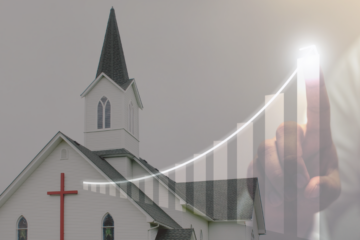7/8/2020 – Pastor Brian’s Blog –
On the first Wednesday of each month my recent blogs have been dealing with the stories behind some of our well known and best loved hymns. These days, there are way too many hymns to look at the story behind each of them, so we are going to simply look at the story behind a prolific hymn writer.
In 2015 Rolling Stone magazine put together a list of the 100 Greatest Songwriters of All Time. The top 10 were names that I was familiar with growing up. Names like Bob Dylan, Paul McCartney, John Lennon, Chuck Berry, Smokey Robinson, Mick Jagger & Keith Richards, Carole King & Gerry Goffin, Paul Simon, Joni Mitchell, and Stevie Wonder.
The person we are going to look at today did not make the top 10. They did not even make the top 25, top 75, or even the top 100! Yet this song writer wrote more than 9,000 hymns! They wrote songs that have outlived their life by far, and I would not even be surprised if we will still be singing some of those songs in eternity!

Francis Jane Crosby, commonly known as Fanny Crosby, has written hymns that are still among the most popular in every Christian denomination. She wrote so many songs that she used pen names so that the hymnals would not be filled with her name above all others.
Born on March 24, 1820 in Putnam County, New York, Crosby became ill within two months. Unfortunately, the family doctor was away, and another man, a “quack” pretending to be a certified doctor, treated her by prescribing hot mustard poultices to be applied to her eyes. Her illness eventually relented, but the treatment left her blind for the rest of her life.
One time a well-meaning preacher said to Fanny, “I think it is a great pity that the Master did not give you sight when he showered so many other gifts upon you.” To which Fanny quickly replied, “Do you know that if at birth I had been able to make one petition, it would have been that I was born blind?” said the poet, who had been able to see only for her first six weeks of life. “Because when I get to heaven, the first face that shall ever gladden my sight will be that of my Savior.”
Her love of poetry began early; her first verse, written at age 8, echoed her lifelong refusal to feel sorry for herself:
Oh, what a happy soul I am, although I cannot see! I am resolved that in this world Contented I will be. How many blessings I enjoy That other people don't, To weep and sigh because I'm blind I cannot, and I won't!
Even more than her love for poetry, Fanny had a passion for God’s Word. Memorizing five chapters a week, even as a child, she could recite the Pentateuch, the Gospels, Proverbs, the Song of Solomon, and many Psalms by chapter and verse.
Shortly before her fifteenth birthday, Crosby was sent to the recently founded New York Institute for the Blind, which would be her home for 23 years: 12 as a student and 11 as a teacher. She initially indulged in her own poetry and was called upon to pen verses for various occasions. In time the principal asked her to avoid such “distractions” in favor of her general instruction. “We have no right to be vain in the presence of the Owner and Creator of all things,” he said.
It was the work of a traveling phrenologist (I know that is a big word for me, so I looked it up! A phrenologist is “someone who studies the shape and irregularities of the skull for insights into character and mental capacity.”) that changed the school’s mind and again ignited her passion. Though his study is now the ridicule of science, the phrenologist’s words were to prove prophetic:
“Here is a poetess. Give her every possible encouragement. Read the best books to her and teach her the finest that is in poetry. You will hear from this young lady someday.”
It wasn’t long after, that Fanny was addressing Congress and making friendships with presidents. In fact, she knew all the chief executives of her lifetime, especially Grover Cleveland, who served as secretary for the Institute for the Blind before his election.
Another student of the Institute for the Blind, Alexander van Alstine, caught Fanny’s fancy and they were married in 1858. Considered one of New York’s best organists, he wrote the music to many of Crosby’s hymns. Crosby herself put music to only a few of hers, though she played harp, piano, guitar, and other instruments. More often, musicians came to her for lyrics.
For example, one day musician William Doane dropped by her home for a surprise visit, begging her to put some words to a tune he had recently written and which he was to perform at an upcoming Sunday School convention. The only problem was that his train to the convention was leaving in 35 minutes. He sat at the piano and played the tune.
“Your music says, ‘Safe in the Arms of Jesus,'” Crosby said, scribbling out the hymn’s words immediately. “Read it on the train and hurry. You don’t want to be late!” The hymn became one of Crosby’s most famous.
Though she was under contract to submit three hymns a week to her publisher and often wrote six or seven a day (for a dollar or two each), many became incredibly popular. When Dwight Moody and Ira Sankey began to use them in their crusades, they received even more attention. Among them are “Blessed Assurance,” “All the Way My Savior Leads Me,” “To God Be the Glory,” “Pass Me Not, O Gentle Savior,” “Safe in the Arms of Jesus,” “Rescue the Perishing,” and “Jesus Keep Me Near the Cross.”
Fanny could write very complex hymns and compose music with a more classical structure (she could even improvise it), but she preferred to write simple, sentimental verses that could be used for evangelism. Fanny continued to write her poetry up to her death; a month shy of her ninety-fifth birthday she wrote… “You will reach the river brink, some sweet day, by and by,” which would be her last stanza.
Maybe Francis Jane Crosby did not make Rolling Stone magazine’s list of the 100 Greatest Songwriters of All Time, but when she saw Jesus, things like that would not matter. May we too live a life that when we die, people will look at our life and know that we had made a difference in the lives of people, a difference that would last for all eternity.
Although we would be hard pressed to say which hymn was the most powerful or the most popular, as you remember the story of Fanny Crosby, may her hymn minister to you today…


